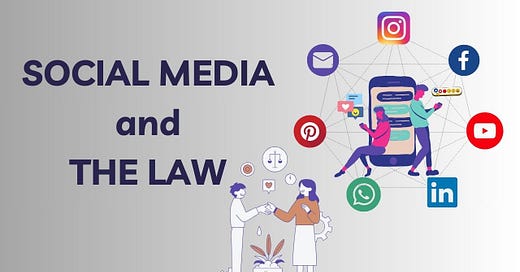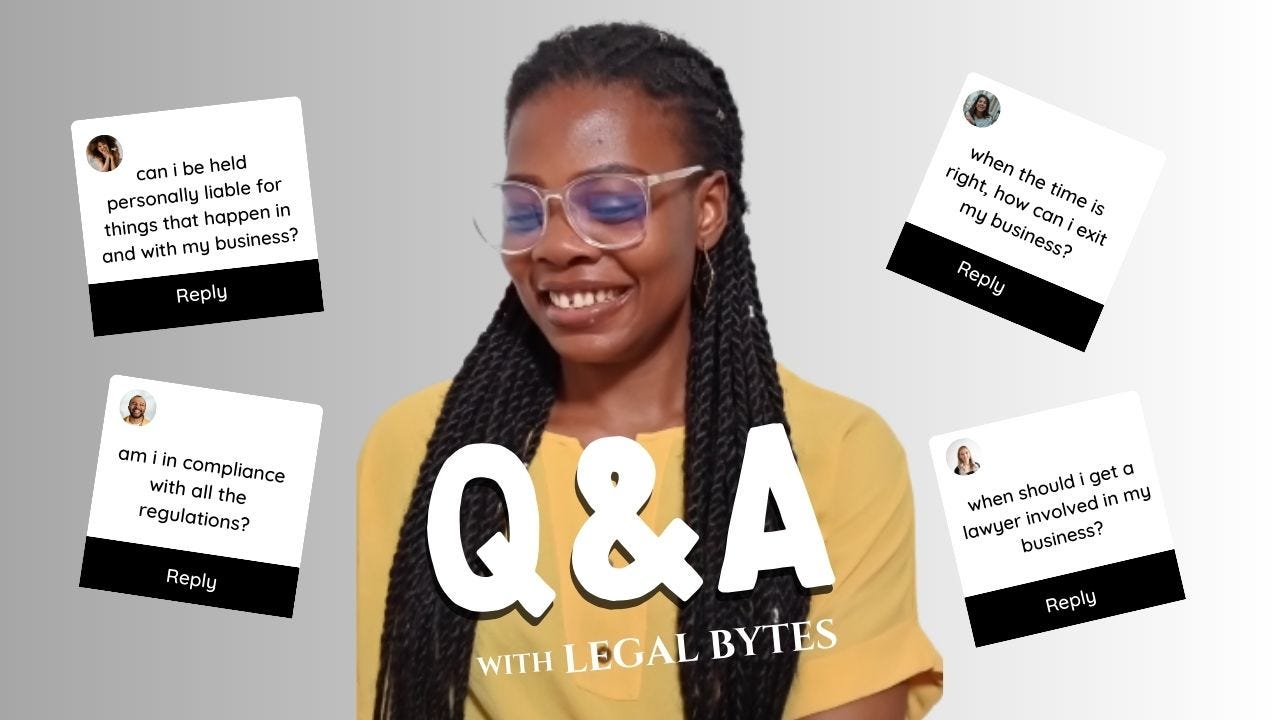LIKES, LAWS, and LIBERATION: Unraveling Social Media's Legal Complexities
Posting, scrolling, liking, and sharing - the daily rituals of our digital lives. But what happens when these actions collide with the intricacies of the law?
The term “social media” refers to social platforms where people share ideas, information, thoughts, media, and communication. It has evolved from a mere communication hub to an indispensable business tool utilized by companies to reach customers, generate leads, understand customer behavior, interact, promote products/services, gauge customer trends, drive sales through advertising, and offer support/service.
Even governments use it to publicize their opinions, interact with the citizens, foster citizen participation, analyze and monitor public opinion, educate the public on matters of national importance, encourage open governance, and reputation management as seen in places like Dubai, Eygpt, Saudi Arabia, United Arab Emirates, etc
The presence of social media is felt in diverse areas, and we’re delving into its effects on certain areas of law and everyday life. These areas include privacy, intellectual property, defamation, economy, employment, law enforcement, religion, and governmental regulation of social media.
Social Media and Privacy: The world of social media is a treasure trove of personal information, sometimes shared without your knowledge or consent. Social media privacy concerns are associated with data mining, phishing attempts, malware sharing, and botnet attacks. Unfortunately, enforcement of rights to privacy is subjective and not absolute because it can be attenuated in the interest of justice.
Social Media and Intellectual Property: When you join a social media platform, you often grant it a transferable, royalty-free, worldwide license to use your content. But how does this affect your intellectual property rights?
Social media serves as an internet intermediary between parties who develop and upload content for others to view. It contains a lot of Intellectual Property and even though the platforms make ease of use seamless, some of the content is not free to use, share with others, and/or commercialize (ie., IP infringements and unlawful use & distribution of content). Such content may be used for nefarious purposes like business impersonations, IP theft, fraud, etc. Unfortunately, only a few laws like the Digital Millenium Copyright Act (DMCA), the Nigerian Copyright Act, etc address IP infringements on online content or a digital platform, and the liability of these internet service providers or intermediaries when an infringement occurs.
Social Media and Defamation: Defamation is a false statement presented as fact about a third party that causes injury or damage to the party's character and reputation. Victims of online defamation often sue the social media platforms that host the defamatory content. Unfortunately, most ISPs or social media platforms are protected by the Communications Decency Act S. 230 (c) [applicable chiefly in the US as most of the globally used social media platforms originated therefrom] that grants immunity to providers and users of "interactive computer service" who publish info provided by 3rd party users.
Social Media and the Economy: The economic impact of social media is undeniable. It's become a hub for human and intellectual capital, enabling knowledge sharing, the rise of the creator economy (worth approximately $100 billion USD), and adding between $900 billion USD to $1.3 trillion USD to the economy. The creative industry (brought to the fore in 2017) created about 30 million jobs worldwide (nearly half being women), and 4.2 million in Nigeria, with the potential to create 2.7 million more jobs by 2025.
Other areas of its positive economic influence include marketing, information distribution, global product adoption, social connectedness, communication, and politics. Notwithstanding these benefits, some studies show that social media has negatively impacted the economy by increasing the time it takes to filter relevant information from irrelevant ones, reducing labor productivity, and over-exposure to content that increases mental health illness.
Social Media and Employment: Social media has blurred the lines between personal and professional life. Employers now use social media to screen candidates, monitor employees, and promote their brand, which can raise ethical questions of discrimination, and privacy infringement, if done inappropriately.
Social Media and Law Enforcement: For law enforcement, social media can be a valuable tool for community relations, investigations, and information dissemination. But it also poses risks, including reputation damage.
Social Media and Religion: social media has revolutionized the way religion is practiced and discussed. Religious institutions use it to spread the gospel, their beliefs, and faith to the public. It is beneficial for the exhortation of a community, but the influx of divergent content affects one’s own beliefs, religious patterns, and thought processes if not firmly grounded.
More so, offering dissenting opinions to “sensitive” social conversations on abortion, gender equality, conformism, identity, LGBTQIA+, etc. poses the risk of being termed intolerant, phobic, or narrow-minded. This risks the dilution of religious and moral principles, as people may adopt popular philosophies just to fit in or avoid “cancel culture”.
Governmental Regulation of Social Media: The need to regulate social media is evident, given its influence on public discourse. However, to regulate these behemoth social networks is an arduous task because their frameworks are created to suit the masses, not indigenous cultures, the value of usage outweighs the risks of violating preventive bans, cyberspace regulation is expensive, and the technology evolves faster than the laws can keep up with
Social media's impact on the law is a complex and ever-evolving topic. We encourage you to join the conversation in the comments. Share your opinions, recommendations, and any other topic you'd like us to explore further.
Other Bytes - trending stories we’re also following
+ Google says Law Suit would take Sledgehammer to Generative AI
+ Why Power is Passing to Courts to Make US Crypto Policy
+ Advancing the Rule of Law and justice for All through Technology Must Include Equal Internet Access, Human Rights Compliance, Sixth Committee Speakers Stress
+ Your Organisation has suffered a Data Incident. Here are the regulators it will likely encounter
+ Ready to Draft an Up-to-Date AI Policy? Target Top Risks
+ Scrutiny on Tracking Pixels Signals shift for Data Collection
Writer’s Bit - links to resources curated for you
Podcast: Evidence we’re in a Simulation is Everywhere. All you have to do is Look | Joshca Bach | Pt. 2
Article: 10 Best SEO Audit Tools in 2023 (Free & Paid)
Video: Life is Spiritual |Pst. Chris Oyakhilome|
AudioBook: The Game of Life and How to Play It (1925) Florence Scovel Shinn
About Legal Bytes
We are Adune Legal’s weekly Newsletter, which simplifies the Law for Busy Executives, Entrepreneurs, and Tech Enthusiasts interested in the legal aspects of Business, Technology, and Intellectual Property.
Stay ahead in the evolving legal landscape with expert analysis and updates.
We love emails from our readers— reply to this email and let us know your thoughts and suggestions.
WAIT!!!
We're excited to announce that subscribers have access to Live Q&A sessions every Wednesday. It’s an excellent opportunity for our community to interact and get answers to their legal questions. Don't miss out on this perk - subscribe today and start enjoying it!
Thanks for reading Legal Bytes
Adune Legal’s Team
P.S. Like Legal Bytes? Please forward us to a friend.
P.P.S. Was this email forwarded to you? Sign up here & see previous emails.





